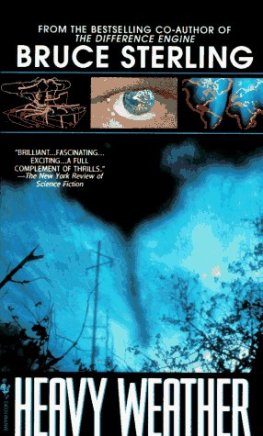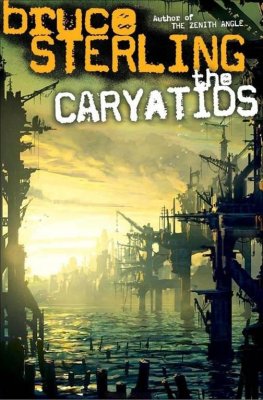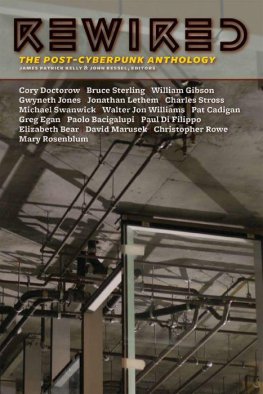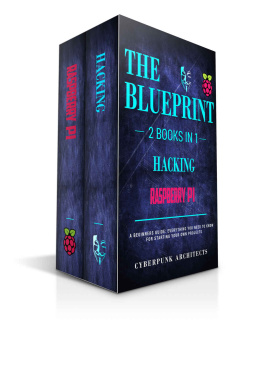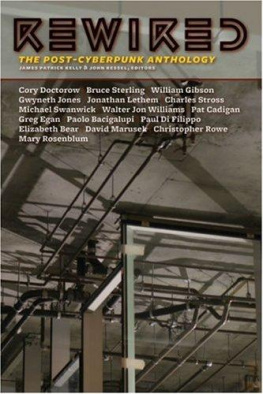Bruce Sterling - Cyberpunk in the Nineties
Here you can read online Bruce Sterling - Cyberpunk in the Nineties full text of the book (entire story) in english for free. Download pdf and epub, get meaning, cover and reviews about this ebook. genre: Science fiction. Description of the work, (preface) as well as reviews are available. Best literature library LitArk.com created for fans of good reading and offers a wide selection of genres:
Romance novel
Science fiction
Adventure
Detective
Science
History
Home and family
Prose
Art
Politics
Computer
Non-fiction
Religion
Business
Children
Humor
Choose a favorite category and find really read worthwhile books. Enjoy immersion in the world of imagination, feel the emotions of the characters or learn something new for yourself, make an fascinating discovery.

- Book:Cyberpunk in the Nineties
- Author:
- Genre:
- Rating:3 / 5
- Favourites:Add to favourites
- Your mark:
- 60
- 1
- 2
- 3
- 4
- 5
Cyberpunk in the Nineties: summary, description and annotation
We offer to read an annotation, description, summary or preface (depends on what the author of the book "Cyberpunk in the Nineties" wrote himself). If you haven't found the necessary information about the book — write in the comments, we will try to find it.
Cyberpunk in the Nineties — read online for free the complete book (whole text) full work
Below is the text of the book, divided by pages. System saving the place of the last page read, allows you to conveniently read the book "Cyberpunk in the Nineties" online for free, without having to search again every time where you left off. Put a bookmark, and you can go to the page where you finished reading at any time.
Font size:
Interval:
Bookmark:
Bruce Sterling
Cyberpunk in the Nineties
This is my sixth and last column for INTERZONE, as I promised ayear ago when I began this series. I've enjoyed doing these pieces,and would like to thank the energetic editor and indulgent readershipof INTERZONE. A special thanks to those who contributed terms andcomments for "The SF Workshop Lexicon," which remains an ongoingproject, and will show up again someday, probably in embarrassingcompany. Those readers who had enough smarts and gumption to buythe SIGNAL catalog (see column one in issue 37) have been wellrewarded, I trust.
In this final column, I would like to talk frankly about"cyberpunk" -- not cyberpunk the synonym for computer criminal, butCyberpunk the literary movement.
Years ago, in the chilly winter of 1985 -- (we used to have chillywinters then, back before the ozone gave out) -- an article appeared inINTERZONE #14, called "The New Science Fiction." "The New ScienceFiction" was the first manifesto of "the cyberpunk movement." Thearticle was an analysis of the SF genre's history and principles; theword "cyberpunk" did not appear in it at all. "The New SF" appearedpseudonymously in a British SF quarterly whose tiny circulation didnot restrain its vaulting ambitions. To the joy of dozens, it hadrecently graduated to full-colour covers. A lovely spot for amanifesto.
Let's compare this humble advent to a recent article,"Confessions of an Ex-Cyberpunk," by my friend and colleague Mr.Lewis Shiner. This piece is yet another honest attempt by SomeoneWho Was There to declare cyberpunk dead. Shiner's article appearedon Jan 7, 1991, in the editorial page of THE NEW YORK TIMES.
Again an apt venue, one supposes, but illustrative of theparadoxical hazards of "movements." An avalanche, started with ashout and a shove somewhere up at the timberline, cannot be stoppedagain with one's hands, even with an audience of millions of mundanes.
"Cyberpunk," before it acquired its handy label and its sinisterrep, was a generous, open-handed effort, very street-level andanarchic, with a do-it-yourself attitude, an ethos it shared with garage-band 70s punk music. Cyberpunk's one-page propaganda organ,"CHEAP TRUTH," was given away free to anyone who asked for it.CHEAP TRUTH was never copyrighted; photocopy "piracy" was activelyencouraged.
CHEAP TRUTH's contributors were always pseudonymous, anearnest egalitarian attempt to avoid any personality-cultism orcliquishness. CHEAP TRUTH deliberately mocked established "genregurus" and urged every soul within earshot to boot up a word-processor and join the cause. CT's ingenuous standards for SF weresimply that SF should be "good" and "alive" and "readable." But whenput in practice, these supposed qualities were something else again.The fog of battle obscured a great deal at the time.
CHEAP TRUTH had rather mixed success. We had a laudablegrasp of the basics: for instance, that SF writers ought to *work a lotharder* and *knock it off with the worn-out bullshit* if they expectedto earn any real respect. Most folks agreed that this was a fineprescription -- for somebody else. In SF it has always been fatallyeasy to shrug off such truisms to dwell on the trivialities of SF as acareer: the daily grind in the Old Baloney Factory. Snappycyberpunk slogans like "imaginative concentration" and "technologicalliteracy" were met with much the same indifference. Alas, ifpreaching gospel was enough to reform the genre, the earth wouldsurely have quaked when Aldiss and Knight espoused much the sameideals in 1956.
SF's struggle for quality was indeed old news, except to CHEAPTRUTH, whose writers were simply too young and parochial to havecaught on. But the cultural terrain had changed, and that made a lotof difference. Honest "technological literacy" in the 50s wasexhilirating but disquieting -- but in the high-tech 80s, "technologicalliteracy" meant outright *ecstasy and dread.* Cyberpunk was *weird,*which obscured the basic simplicity of its theory-and-practice.
When "cyberpunk writers" began to attract real notoriety, theidea of cyberpunk principles, open and available to anyone, was lostin the murk. Cyberpunk was an instant cult, probably the verydefinition of a cult in modern SF. Even generational contemporaries,who sympathized with much CHEAP TRUTH rhetoric, came to distrustthe cult itself -- simply because the Cyberpunks had become "genregurus" themselves.
It takes shockingly little, really, to become a genre guru.Basically, it's as easy as turning over in bed. It's questionable whetherone gains much by the effort. Preach your fool head off, but whotrusts gurus, anyway? CHEAP TRUTH never did! All in all, it tookabout three years to thoroughly hoist the Movement on its own petard.CHEAP TRUTH was killed off in 1986.
I would like to think that this should be a lesson to somebodyout there. I very much doubt it, though.
Rucker, Shiner, Sterling, Shirley and Gibson -- the Movement'smost fearsome "gurus," ear-tagged yet again in Shiner's worthy article,in front of the N. Y. TIMES' bemused millions -- are "cyberpunks" forgood and all. Other cyberpunks, such as the six other worthycontributors to MIRRORSHADES THE CYBERPUNK ANTHOLOGY, may beable to come to their own terms with the beast, more or less. But thedreaded C-Word will surely be chiselled into our five tombstones.Public disavowals are useless, very likely *worse* than useless. Eventhe most sweeping changes in our philosophy of writing, perhaps weirdmid-life-crisis conversions to Islam or Santeria, could not erase thetattoo.
Seen from this perspective, "cyberpunk" simply means "anythingcyberpunks write." And that covers a lot of ground. I've always had aweakness for historical fantasies, myself, and Shiner writesmainstream novels and mysteries. Shirley writes horror. Rucker waslast seen somewhere inside the Hollow Earth. William Gibson,shockingly, has been known to write funny short stories. All thismeans nothing. "Cyberpunk" will not be conclusively "dead" until thelast of us is shovelled under. Demographics suggest that this is likelyto take some time.
CHEAP TRUTH's promulgation of open principles was of dubioususe -- even when backed by the might of INTERZONE. Perhaps"principles" were simply too foggy and abstract, too arcane andunapproachable, as opposed to easy C-word recognition symbols, likecranial jacks, black leather jeans and amphetamine addiction. Buteven now, it may not be too late to offer a concrete example of thegenuine cyberpunk *weltanschauung* at work.
Consider FRANKENSTEIN by Mary Shelley, a wellspring ofscience fiction as a genre. In a cyberpunk analysis, FRANKENSTEIN is"Humanist" SF. FRANKENSTEIN promotes the romantic dictum thatthere are Some Things Man Was Not Meant to Know. There are nomere physical mechanisms for this higher moral law -- its workingstranscend mortal understanding, it is something akin to divine will.Hubris must meet nemesis; this is simply the nature of our universe.Dr. Frankenstein commits a spine-chilling transgression, an affrontagainst the human soul, and with memorable poetic justice, he is direlypunished by his own creation, the Monster.
Now imagine a cyberpunk version of FRANKENSTEIN. In thisimaginary work, the Monster would likely be the well-funded R&Dteam-project of some global corporation. The Monster might wellwreak bloody havoc, most likely on random passers-by. But havingdone so, he would never have been allowed to wander to the NorthPole, uttering Byronic profundities. The Monsters of cyberpunk nevervanish so conveniently. They are already loose on the streets. Theyare next to us. Quite likely *WE* are them. The Monster would havebeen copyrighted through the new genetics laws, and manufacturedworldwide in many thousands. Soon the Monsters would all havelousy night jobs mopping up at fast-food restaurants.
In the moral universe of cyberpunk, we *already* know ThingsWe Were Not Meant To Know. Our *grandparents* knew these things;Robert Oppenheimer at Los Alamos became the Destroyer of Worldslong before we arrived on the scene. In cyberpunk, the idea that thereare sacred limits to human action is simply a delusion. There are nosacred boundaries to protect us from ourselves.
Font size:
Interval:
Bookmark:
Similar books «Cyberpunk in the Nineties»
Look at similar books to Cyberpunk in the Nineties. We have selected literature similar in name and meaning in the hope of providing readers with more options to find new, interesting, not yet read works.
Discussion, reviews of the book Cyberpunk in the Nineties and just readers' own opinions. Leave your comments, write what you think about the work, its meaning or the main characters. Specify what exactly you liked and what you didn't like, and why you think so.

